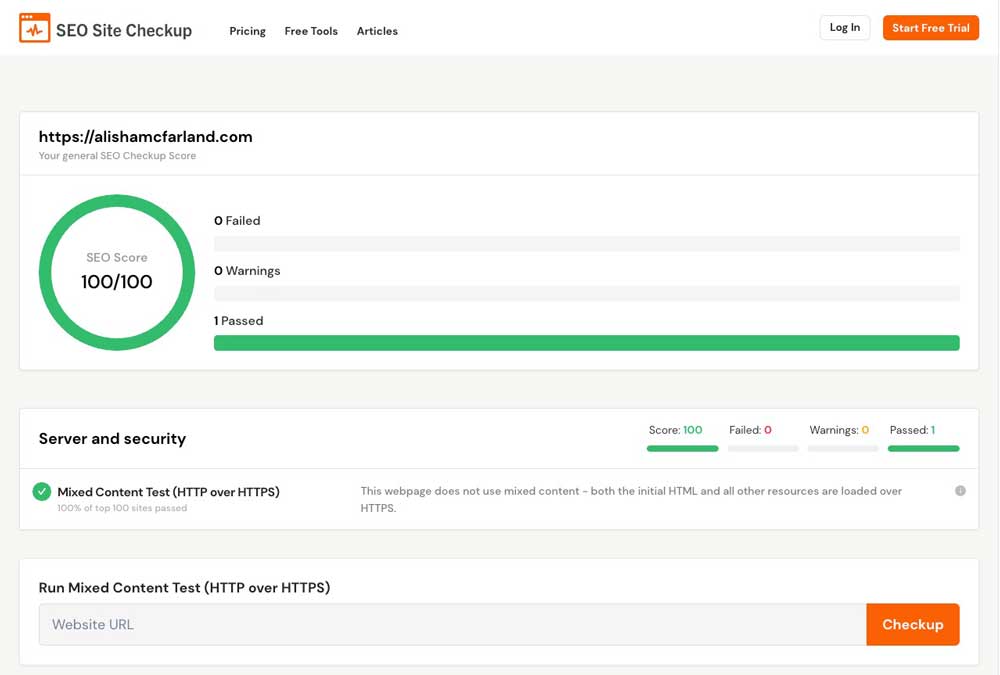Have you ever clicked on a link in your search results that took you to a website that looks like it hasn’t been updated since the 90’s? I have. And the first place I’ll look is in the upper left corner to see if it has an SSL certificate. If it doesn’t, I leave quickly. I’m not the only one.
Each time we hear about data breaches, compromised credit card information, and cyber attacks, we get more and more skeptical of every website we visit. So if your website looks potentially insecure, your likely losing a lot of visitors because they don’t trust the experience they might have by browsing through the content of your site.
That padlock is one of the most essential tools in building trust with your first-time website visitors. It means that your website uses HTTPS, or Hypertext Transfer Protocol Secure when someone fills out a form, buys something from you, or adds a comment to a blog post. In this article, we’ll talk about why HTTPS is vital for business websites in promoting visitor trust and ensuring a secure online experience.
HTTPS is a secure version of the standard HTTP protocol that facilitates communication between a user's web browser and a website's server. The key difference lies in the added layer of security provided by encryption. When a user's browser communicates with an HTTPS-enabled website, the data exchanged between them is encrypted, making it extremely difficult for malicious actors to intercept or decipher the information. This encryption is achieved through SSL (Secure Sockets Layer) or its successor, TLS (Transport Layer Security) protocols.
The Foundation of Trust
Trust forms the bedrock of any successful business-consumer relationship. Just as a customer entering a physical store expects a safe environment, online visitors demand the same level of security and assurance when interacting with business websites. HTTPS serves as a digital lock that safeguards the sensitive data exchanged between users and websites. This data includes personal information, financial details, and even browsing behavior. When users see the padlock icon and the word “Secure” in the address bar, it sends a clear signal that the business takes their security seriously, fostering a sense of trust.
Encryption: Shield Data From Prying Eyes
At the heart of HTTPS lies encryption, a technology that transforms data into an unreadable format during transmission, only to be decrypted by the intended recipient. This encryption process provides a crucial layer of protection against malicious actors attempting to intercept and exploit data. Imagine a customer making an online purchase and sharing their credit card details. Without encryption, these details could potentially be captured by cybercriminals lurking in the digital shadows. HTTPS not only thwarts these attacks but also assures customers that their confidential information remains confidential.
Guarding Against Cyber Threats
Cyber threats are an unfortunate reality these days. From phishing attacks that attempt to steal sensitive information to man-in-the-middle attacks that intercept communication between a user and a website, businesses face a myriad of dangers. HTTPS acts as a powerful shield against such threats. By encrypting data, it becomes significantly harder for attackers to decipher the information they intercept. This proactive stance against cyber threats not only safeguards users but also showcases the business’s commitment to their well-being.
SEO Benefits and User Experience
Beyond security, HTTPS also offers tangible benefits in terms of search engine optimization (SEO) and user experience. Major search engines, including Google, prioritize secure websites in their rankings. This means that websites with HTTPS are more likely to appear at the top of search results, leading to increased visibility and potentially higher organic traffic. Additionally, modern web browsers often display warnings when users attempt to visit non-secure websites, potentially deterring them from proceeding. By adopting HTTPS, businesses eliminate these warnings, creating a smoother and more trustworthy browsing experience.
Transactional Confidence
For businesses engaged in e-commerce, the stakes are even higher. Customers need to feel confident that their online transactions are secure, especially when entering payment information. The presence of HTTPS becomes particularly vital during these transactions. It not only safeguards payment details but also bolsters the confidence of customers, ensuring they complete their purchases without hesitation. This trust is essential for building a loyal customer base and encouraging repeat business.
Transparency and Brand
In an era of data breaches and online vulnerabilities, businesses that prioritize security and transparency stand out. The decision to implement HTTPS communicates a commitment to protecting customer data and maintaining a secure digital environment. This commitment can have a positive impact on a business’s brand. Customers are more likely to view such businesses as responsible and trustworthy partners, which can lead to stronger customer loyalty and positive word-of-mouth referrals.
The Evolving Landscape of HTTPS
While HTTPS was once primarily associated with e-commerce and sensitive transactions, its importance has expanded to encompass all types of websites. Whether a business collects user information through contact forms or simply provides informative content, the need for encryption and security remains constant. The online landscape is evolving, and businesses that fail to adopt HTTPS risk falling behind their competitors and losing the trust of their visitors.
Take Action!
SSL/TLS Certificates
The first step towards HTTPS implementation is obtaining an SSL/TLS certificate. Many hosting providers offer certificates for free or at a minimal cost so check there first if your website is still insecure.
Web Hosting
If your website hosting provider does not offer certificates or doesn’t take security seriously, it is worth choosing a different hosting service that supports HTTPS. Hosting plans that include SSL/TLS certificates often offer a transfer service that makes the process much easier.
If you’re using WordPress and want a free SSL certificate along with an ongoing commitment to security, I highly recommend WPEngine. Get 4 months free on all shared hosting plans at WP Engine with code, wpe4free. Buy now!
Content Updates
Updating internal links, images, and other resources to use HTTPS is important for creating a seamless user experience. Mixed content (a combination of HTTP and HTTPS resources) can trigger warnings in browsers and deter visitors. There are free tools on the internet that will check your website for you – SEO Site Checkup (https://seositecheckup.com/tools/mixed-content-test-http-over-https) is a good place to start.

301 Redirects
Implementing 301 redirects ensures that visitors are automatically directed to the HTTPS version of the website even if they try to access the HTTP version.
Ongoing Maintenance
Regularly updating SSL/TLS certificates and staying informed about security best practices is crucial for maintaining a secure online environment for your website visitors.
Take Away
In a time where information flows freely and data breaches are common place businesses must take proactive steps to secure their online presence. HTTPS is a cornerstone in this effort, offering encryption, protection against cyber threats, and a visible symbol of trust for visitors. As customers become more discerning about the security of their online interactions, businesses that prioritize HTTPS send a clear message: your security matters. By embracing HTTPS, businesses not only safeguard their visitors’ sensitive information but also establish themselves as reliable, responsible, and customer-focused.


